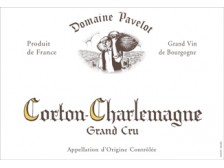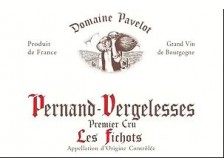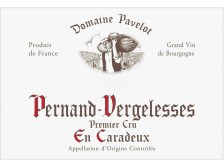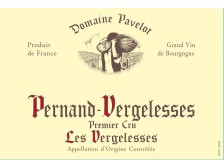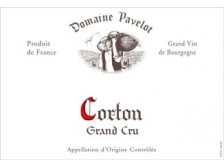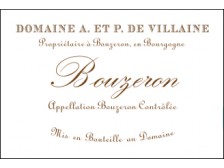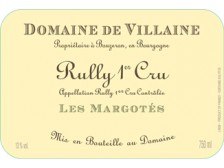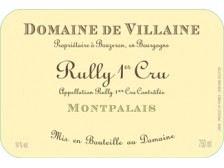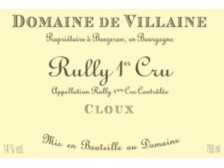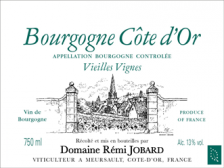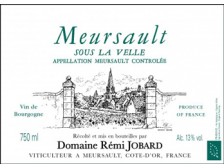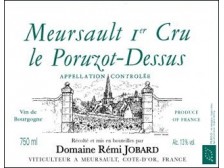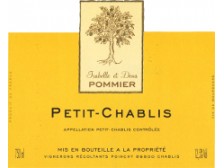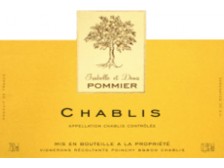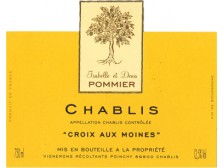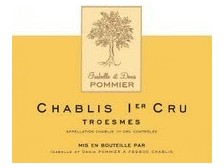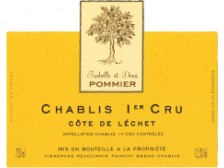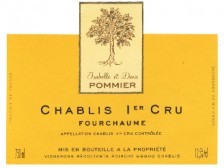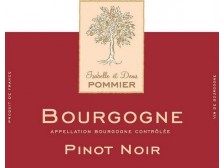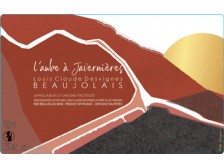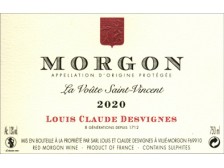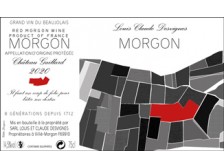Catalog
Other labels exist (Demeter, Biodyvin, Nature et Progrès...). These have more demanding specifications than organic farming but are not recognised by public agencies.
-
With 10 ha in the combe of Pernand-Vergelesses, Domaine Pavelot present the best facet of Burgundy: organic viticulture thought out in the respect of the viticultural tradition (manual harvest in wicker baskets, natural yeasts, vinification 30% to 50% in whole bunches, etc. ) with the tools and achievements of today's oenology (sorting on a vibrating table, precise sulphiting of the harvest, pre-fermentation maceration, etc.) and above all, prices that are the opposite of the prevailing speculation. Their whites and reds are models of style, balance and aromatic purity.
The Revue du Vin de France rightly hails the work accomplished by Luc Pavelot in recent vintages: “All his 2022s are intense, fragrant, with incredible density of fruit. Pure marvels with an exceptional price/pleasure ratio”.
Awarded one star in the 2026 Guide of the Revue du Vin de France.
The 2023 vintage in the press:
Bourgogne Aujourd'hui (September 2024): 16/20 “Made from 75-year-old vines, this cuvée reveals a lemony, mineral, well-typed nose. Concentrated, invigorating and pure on the palate, with ripe citrus fruit, good persistence and potential.”
Bettane + Desseauve (Guide 2026) : 96/100
More- To keep or to drink:
- Wait 3 to 5 years
- Apogée:
- 2030-2043
- Organic certification:
- 2009
-
With 10 ha in the combe of Pernand-Vergelesses, Domaine Pavelot present the best facet of Burgundy: organic viticulture thought out in the respect of the viticultural tradition (manual harvest in wicker baskets, natural yeasts, vinification 30% to 50% in whole bunches, etc. ) with the tools and achievements of today's oenology (sorting on a vibrating table, precise sulphiting of the harvest, pre-fermentation maceration, etc.) and above all, prices that are the opposite of the prevailing speculation. Their whites and reds are models of style, balance and aromatic purity.
The Revue du Vin de France rightly hails the work accomplished by Luc Pavelot in recent vintages: “All his 2022s are intense, fragrant, with incredible density of fruit. Pure marvels with an exceptional price/pleasure ratio”.
Awarded one star in the 2026 Guide of the Revue du Vin de France.
The 2023 vintage in the press:
La Revue du Vin de France (Guide 2026): 93/100 "Slightly reduced on the nose, Les Fichots evokes brambles and tart fruit. Its pure, intense fruit reveals an almost rocky sensation despite its soft, silky flesh. A wine to keep in the cellar for at least five years."
More- To keep or to drink:
- Wait 1 to 2 years
- Apogée:
- 2028-2035
- Organic certification:
- 2009
- Alcohol degree:
- 13.5%
-
With 10 ha in the combe of Pernand-Vergelesses, Domaine Pavelot present the best facet of Burgundy: organic viticulture thought out in the respect of the viticultural tradition (manual harvest in wicker baskets, natural yeasts, vinification 30% to 50% in whole bunches, etc. ) with the tools and achievements of today's oenology (sorting on a vibrating table, precise sulphiting of the harvest, pre-fermentation maceration, etc.) and above all, prices that are the opposite of the prevailing speculation. Their whites and reds are models of style, balance and aromatic purity.
The Revue du Vin de France rightly hails the work accomplished by Luc Pavelot in recent vintages: “All his 2022s are intense, fragrant, with incredible density of fruit. Pure marvels with an exceptional price/pleasure ratio”.
Awarded one star in the 2026 Guide of the Revue du Vin de France.
The 2023 vintage in the press:
Bourgogne Aujourd'hui (September 2024): 16.5/20 “Beautiful deep nose of black fruits, blueberries, blackberry jam, a hint of smoke. The palate is balanced, dense, rich, velvety-textured, suave, with beautiful, well-melted notes of breeding.”
Bettane + Desseauve (Guide 2026) : 92/100
More- To keep or to drink:
- Wait 1 to 2 years
- Apogée:
- 2027-2035
- Organic certification:
- 2009
- Alcohol degree:
- 13%
-
With 10 ha in the combe of Pernand-Vergelesses, Domaine Pavelot present the best facet of Burgundy: organic viticulture thought out in the respect of the viticultural tradition (manual harvest in wicker baskets, natural yeasts, vinification 30% to 50% in whole bunches, etc. ) with the tools and achievements of today's oenology (sorting on a vibrating table, precise sulphiting of the harvest, pre-fermentation maceration, etc.) and above all, prices that are the opposite of the prevailing speculation. Their whites and reds are models of style, balance and aromatic purity.
The Revue du Vin de France rightly hails the work accomplished by Luc Pavelot in recent vintages: “All his 2022s are intense, fragrant, with incredible density of fruit. Pure marvels with an exceptional price/pleasure ratio”.
Awarded one star in the 2026 Guide of the Revue du Vin de France.
The 2022 vintage in the reviews :
La Revue du Vin de France (Guide 2026) : 95/100 "In Caradeux, a first growth with a refined approach, but with a tight structure – an iron fist in a velvet glove – and a juice of great purity."
Bettane + Desseauve (Guide 2026) : 93/100
More- To keep or to drink:
- Wait 1 to 2 years
- Apogée:
- 2027-2035
- Organic certification:
- 2009
- Alcohol degree:
- 13%
-
With 10 ha in the combe of Pernand-Vergelesses, Domaine Pavelot present the best facet of Burgundy: organic viticulture thought out in the respect of the viticultural tradition (manual harvest in wicker baskets, natural yeasts, vinification 30% to 50% in whole bunches, etc. ) with the tools and achievements of today's oenology (sorting on a vibrating table, precise sulphiting of the harvest, pre-fermentation maceration, etc.) and above all, prices that are the opposite of the prevailing speculation. Their whites and reds are models of style, balance and aromatic purity.
The Revue du Vin de France rightly hails the work accomplished by Luc Pavelot in recent vintages: “All his 2022s are intense, fragrant, with incredible density of fruit. Pure marvels with an exceptional price/pleasure ratio”.
Awarded one star in the 2026 Guide of the Revue du Vin de France.
The 2022 vintage in the press:
La Revue du Vin de France (Guide 2026): 94/100 "More autumnal on opening, Les Vergelesses takes time to reveal itself: from the nose, one perceives great finesse, confirmed on the palate with dense and precise juice. The tannins are very delicate, ripe and well-coated. A major wine from the estate that will evolve slowly but gracefully."
Bettane + Desseauve (Guide 2026) : 94/100
More- To keep or to drink:
- Wait 3 to 5 years
- Apogée:
- 2029-2038
- Organic certification:
- 2009
- Alcohol degree:
- 14%
-
With 10 ha in the combe of Pernand-Vergelesses, Domaine Pavelot present the best facet of Burgundy: organic viticulture thought out in the respect of the viticultural tradition (manual harvest in wicker baskets, natural yeasts, vinification 30% to 50% in whole bunches, etc. ) with the tools and achievements of today's oenology (sorting on a vibrating table, precise sulphiting of the harvest, pre-fermentation maceration, etc.) and above all, prices that are the opposite of the prevailing speculation. Their whites and reds are models of style, balance and aromatic purity.
The Revue du Vin de France rightly hails the work accomplished by Luc Pavelot in recent vintages: “All his 2022s are intense, fragrant, with incredible density of fruit. Pure marvels with an exceptional price/pleasure ratio”.
Awarded one star in the 2026 Guide of the Revue du Vin de France.
The 2023 vintage in the press :Bettane + Desseauve (Guide 2026) : 95/100More- To keep or to drink:
- Wait 5 to 10 years
- Apogée:
- 2032-2045
- Organic certification:
- 2009
- Alcohol degree:
- 13%
-
Aubert de Villaine, the emblematic co-owner and manager of La Romanée-Conti, lives and works in Bouzeron, the first village south of the Côte de Beaune, on his Domaine acquired in 1971. Assisted since 2003 by his nephew Pierre de Benoist, he practises the same high-flying viticulture as at La Romanée-Conti, combining tradition, openness, purity, rigour and organic cultivation (since 1986).
Domaine rated one star in the Revue du Vin de France guide, and named one of the top 5 producers of 2021 by the magazine Bourgogne Aujourd'hui.Bouzeron, 100% golden aligoté, carries high the values of this particularly underestimated grape variety.
The 2022 vintage in the press:
La Revue du Vin de France (Guide 2025): 93/100 “Seyant volume, chalky material and sober flavors in the bouzeron, with a refined and vibrant structure, which has many fine years ahead of it.”
More- To keep or to drink:
- Wait 1 to 2 years
- Apogée:
- 2027-2035
-
Aubert de Villaine, the emblematic co-owner and manager of La Romanée-Conti, lives and works in Bouzeron, the first village south of the Côte de Beaune, on his Domaine acquired in 1971. Assisted since 2003 by his nephew Pierre de Benoist, he practises the same high-flying viticulture as at La Romanée-Conti, combining tradition, openness, purity, rigour and organic cultivation (since 1986).
Domaine rated one star in the Revue du Vin de France guide, and named one of the top 5 producers of 2021 by the magazine Bourgogne Aujourd'hui.The 2022 vintage in the press:
La Revue du Vin de France (Guide 2026): 93/100 "A full-bodied Margot with flavours of yellow fruit and white pepper."
More- To keep or to drink:
- Ready to drink
- Apogée:
- 2026-2038
- Alcohol degree:
- 13.5%
-
Aubert de Villaine, the emblematic co-owner and manager of La Romanée-Conti, lives and works in Bouzeron, the first village south of the Côte de Beaune, on his Domaine acquired in 1971. Assisted since 2003 by his nephew Pierre de Benoist, he practises the same high-flying viticulture as at La Romanée-Conti, combining tradition, openness, purity, rigour and organic cultivation (since 1986).
Domaine rated one star in the Revue du Vin de France guide, and named one of the top 5 producers of 2021 by the magazine Bourgogne Aujourd'hui.The 2016 vintage in the press:
Vinous (N. Martin - March 2022): 90/100 “This delightful 2016 Rully Les Margotes 1er Cru will provide ample drinking pleasure over the next dacade. Bright scents of conference pear and Granny Smith apple on the nose seem to gain intensity with aeration; then, the palate is well blanced with nicely judged acidity. I admire the harmony ad precision of this Rully, with just a kiss of lemongrass on the finish. Recommended.”
More- To keep or to drink:
- Ready to drink
- Apogée:
- 2021-2032
-
Aubert de Villaine, the emblematic co-owner and manager of La Romanée-Conti, lives and works in Bouzeron, the first village south of the Côte de Beaune, on his Domaine acquired in 1971. Assisted since 2003 by his nephew Pierre de Benoist, he practises the same high-flying viticulture as at La Romanée-Conti, combining tradition, openness, purity, rigour and organic cultivation (since 1986).
Domaine rated one star in the Revue du Vin de France guide, and named one of the top 5 producers of 2021 by the magazine Bourgogne Aujourd'hui.More- To keep or to drink:
- Wait 1 to 2 years
- Apogée:
- 2028-2038
- Alcohol degree:
- 14.5%
-
Aubert de Villaine, the emblematic co-owner and manager of La Romanée-Conti, lives and works in Bouzeron, the first village south of the Côte de Beaune, on his Domaine acquired in 1971. Assisted since 2003 by his nephew Pierre de Benoist, he practises the same high-flying viticulture as at La Romanée-Conti, combining tradition, openness, purity, rigour and organic cultivation (since 1986).
Domaine rated one star in the Revue du Vin de France guide, and named one of the top 5 producers of 2021 by the magazine Bourgogne Aujourd'hui.More- To keep or to drink:
- Ready to drink
- Apogée:
- 2026-2040
- Alcohol degree:
- 14%
-
Aubert de Villaine, the emblematic co-owner and manager of La Romanée-Conti, lives and works in Bouzeron, the first village south of the Côte de Beaune, on his Domaine acquired in 1971. Assisted since 2003 by his nephew Pierre de Benoist, he practises the same high-flying viticulture as at La Romanée-Conti, combining tradition, openness, purity, rigour and organic cultivation (since 1986).
Domaine rated one star in the Revue du Vin de France guide, and named one of the top 5 producers of 2021 by the magazine Bourgogne Aujourd'hui.The 2022 vintage in the press:
La Revue du Vin de France (Guide 2026): 92/100 "Slightly reduced, Les Cloux is tighter and has bitter notes."
More- To keep or to drink:
- Wait 1 to 2 years
- Apogée:
- 2028-2040
- Alcohol degree:
- 13.5%
-
Rémi Jobard is one of Meursault's most respected winemakers, diligently producing the archetype of the great Meursault wines in organic farming since 2008: rich, generous and mineral, subtly wooded and perfectly suited to ageing (8 to 15 years).
More- To keep or to drink:
- Ready to drink
- Apogée:
- 2025-2032
- Organic certification:
- 2008
- Alcohol degree:
- 13%
-
Rémi Jobard is one of Meursault's most respected winemakers, diligently producing the archetype of the great Meursault wines in organic farming since 2008: rich, generous and mineral, subtly wooded and perfectly suited to ageing (8 to 15 years).
More- To keep or to drink:
- Ready to drink
- Apogée:
- 2025-2033
- Organic certification:
- 2008
- Alcohol degree:
- 13%
-
Rémi Jobard is one of Meursault's most respected winemakers, diligently producing the archetype of the great Meursault wines in organic farming since 2008: rich, generous and mineral, subtly wooded and perfectly suited to ageing (8 to 15 years).
More- To keep or to drink:
- Ready to drink
- Apogée:
- 2026-2033
- Organic certification:
- 2008
- Alcohol degree:
- 13%
-
Rémi Jobard is one of Meursault's most respected winemakers, diligently producing the archetype of the great Meursault wines in organic farming since 2008: rich, generous and mineral, subtly wooded and perfectly suited to ageing (8 to 15 years).
More- To keep or to drink:
- Ready to drink
- Apogée:
- 2026-2035
- Organic certification:
- 2008
- Alcohol degree:
- 13%
-
Rémi Jobard is one of Meursault's most respected winemakers, diligently producing the archetype of the great Meursault wines in organic farming since 2008: rich, generous and mineral, subtly wooded and perfectly suited to ageing (8 to 15 years).
More- To keep or to drink:
- Wait 1 to 2 years
- Apogée:
- 2027-2037
- Organic certification:
- 2008
- Alcohol degree:
- 13.5%
-
Rémi Jobard is one of Meursault's most respected winemakers, diligently producing the archetype of the great Meursault wines in organic farming since 2008: rich, generous and mineral, subtly wooded and perfectly suited to ageing (8 to 15 years).
More- To keep or to drink:
- Wait 3 to 5 years
- Apogée:
- 2029-2039
- Organic certification:
- 2008
- Alcohol degree:
- 13%
-
Isabelle and Denis Pommier started in 1990 with only 2 ha. They have made gradual progress, both in the constitution of their vineyards (now 16 ha) and in their cultivation practices (tillage, disbudding, certified organic from the 2014 vintage). Their wines, vinified and aged for a long time in oak barrels for Croix aux Moines and the 1st crus, have a richness and amplitude that contrast with the usual extreme vivacity of the Chablis.
According to the Bettane & Desseauve 2025 guide, “perhaps the most spectacular growth in the Chablis region over the last fifteen years”.
Quoted in the guide of the Revue du Vin de France.
The 2023 vintage in the press:
La Revue du Vin de France (Guide 2026) : 90/100 "More iodine-rich, the Petit Chablis delivers a deep body, faithful to the estate's style, with its salinity giving it length."
More- To keep or to drink:
- Ready to drink
- Apogée:
- 2025-2029
- Organic certification:
- 2014
- Alcohol degree:
- 12.5%
-
Isabelle and Denis Pommier started in 1990 with only 2 ha. They have made gradual progress, both in the constitution of their vineyards (now 16 ha) and in their cultivation practices (tillage, disbudding, certified organic from the 2014 vintage). Their wines, vinified and aged for a long time in oak barrels for Croix aux Moines and the 1st crus, have a richness and amplitude that contrast with the usual extreme vivacity of the Chablis.
According to the Bettane & Desseauve 2025 guide, “perhaps the most spectacular growth in the Chablis region over the last fifteen years”.
Quoted in the guide of the Revue du Vin de France.
The 2023 vintage in the press:
Bourgogne Aujourd'hui (December 2025): 91/100 "The estate produced 47,000 bottles of this beautiful blended cuvée. Aromas of citrus and white fruits... Fresh fruit flavours on the palate, with good body, good balance and a salty finish typical of Chablis."
More- To keep or to drink:
- Ready to drink
- Apogée:
- 2026-2033
- Organic certification:
- 2014
- Alcohol degree:
- 12.5%
-
Isabelle and Denis Pommier started in 1990 with only 2 ha. They have made gradual progress, both in the constitution of their vineyards (now 16 ha) and in their cultivation practices (tillage, disbudding, certified organic from the 2014 vintage). Their wines, vinified and aged for a long time in oak barrels for Croix aux Moines and the 1st crus, have a richness and amplitude that contrast with the usual extreme vivacity of the Chablis.
According to the Bettane & Desseauve 2025 guide, “perhaps the most spectacular growth in the Chablis region over the last fifteen years”.
Quoted in the guide of the Revue du Vin de France.
The 2023 vintage in the press:
Bourgogne Aujourd'hui (December 2025): 92/100 "This cuvée, produced from 1.15 hectares of 65-year-old vines, reveals precise, elegant aromas of white fruit and citrus... The wine is harmonious, delicious, invigorating and dense, with fresh, juicy fruitiness and good ageing potential."
More- To keep or to drink:
- Ready to drink
- Apogée:
- 2026-2033
- Organic certification:
- 2014
- Alcohol degree:
- 13%
-
Isabelle and Denis Pommier started in 1990 with only 2 ha. They have made gradual progress, both in the constitution of their vineyards (now 16 ha) and in their cultivation practices (tillage, disbudding, certified organic from the 2014 vintage). Their wines, vinified and aged for a long time in oak barrels for Croix aux Moines and the 1st crus, have a richness and amplitude that contrast with the usual extreme vivacity of the Chablis.
According to the Bettane & Desseauve 2025 guide, “perhaps the most spectacular growth in the Chablis region over the last fifteen years”.
Quoted in the guide of the Revue du Vin de France.
The 2022 vintage in the press:
La Revue du Vin de France (Guide 2026): 93/100 "As a premier cru, Troesmes displays great refinement: chiselled, but with a maturity that gives weight to its invigorating fruit."
La Revue du Vin de France (September 2025) : 93/100 "Lively, it has aromas of crushed stone. In contrast, the palate is tender and smooth, with finesse and delicate bitter notes. It is a true Chablis, but with weight on the palate."
Bourgogne Aujourd'hui (August 2023): 16.5/20 “Rich, elegant, precise aromas of citrus fruit, fresh pineapple, roasted hazelnuts.... Elegant palate, with juicy, ripe, fresh fruit, energy, good length and lots of potential.”
Vinous (N.Martin - August 2024): 92/100 “The 2022 Chablis Troesmes 1er Cru has a clean and precise bouquet with fine mineralité, touches of flint suffusing the malic fruit. The palate is well balanced with a fine bead of acidity, lovely depth and deft use of oak. Faint hints of red fruit surprise on the finish of this quite delicious Chablis from one of its lesser-know climats.”
Bettane + Desseauve (Guide 2026) : 92/100
More- To keep or to drink:
- Ready to drink
- Apogée:
- 2025-2034
- Organic certification:
- 2014
-
Isabelle and Denis Pommier started in 1990 with only 2 ha. They have made gradual progress, both in the constitution of their vineyards (now 16 ha) and in their cultivation practices (tillage, disbudding, certified organic from the 2014 vintage). Their wines, vinified and aged for a long time in oak barrels for Croix aux Moines and the 1st crus, have a richness and amplitude that contrast with the usual extreme vivacity of the Chablis.
According to the Bettane & Desseauve 2025 guide, “perhaps the most spectacular growth in the Chablis region over the last fifteen years”.
Quoted in the guide of the Revue du Vin de France.
The frosts of April 2021 were dramatic in Chablis: Domaine Pommier's 2021 harvest is barely a quarter of a normal harvest.
The 2021 vintage in the press:
Bourgogne Aujourd'hui (August 2024): 17/20 “The estate farms 1.76 hectares of 50-year-old vines in this premier cru. Fine aromas of white flowers, citrus fruit... Rich, juicy and invigorating on the palate, with pleasant lemony fruit and a distinctive mineral-salt base.”
More- To keep or to drink:
- Ready to drink
- Apogée:
- 2025-2034
- Organic certification:
- 2014
-
Isabelle and Denis Pommier started in 1990 with only 2 ha. They have made gradual progress, both in the constitution of their vineyards (now 16 ha) and in their cultivation practices (tillage, disbudding, certified organic from the 2014 vintage). Their wines, vinified and aged for a long time in oak barrels for Croix aux Moines and the 1st crus, have a richness and amplitude that contrast with the usual extreme vivacity of the Chablis.
According to the Bettane & Desseauve 2025 guide, “perhaps the most spectacular growth in the Chablis region over the last fifteen years”.
Quoted in the guide of the Revue du Vin de France.
The frosts of April 2021 were dramatic in Chablis: Domaine Pommier's 2021 harvest is barely a quarter of a normal harvest.
More- To keep or to drink:
- Ready to drink
- Apogée:
- 2025-2035
- Organic certification:
- 2014
- Alcohol degree:
- 13%
-
Isabelle and Denis Pommier started in 1990 with only 2 ha. They have made gradual progress, both in the constitution of their vineyards (now 16 ha) and in their cultivation practices (tillage, disbudding, certified organic from the 2014 vintage). Their wines, vinified and aged for a long time in oak barrels for Croix aux Moines and the 1st crus, have a richness and amplitude that contrast with the usual extreme vivacity of the Chablis.
According to the Bettane & Desseauve 2025 guide, “perhaps the most spectacular growth in the Chablis region over the last fifteen years”.
Quoted in the guide of the Revue du Vin de France.
The 2022 vintage in the press:
La Revue du Vin de France (Guide 2026) : 93/100 "Fourchaume evokes stone; its lively but ripe fruit stretches out with stimulating bitter notes, which anchor its persistence."
La Revue du Vin de France (September 2025): 93/100 "Smooth, as if polished by its ageing, it is creamy, curvy but mouth-watering with pure fruit and notes of lemon and salt."
Bourgogne Aujourd'hui (August 2023): 16.5/20 “Expressive, fine aromas of ripe, fresh, bright fruit... Rich, gourmet palate, with a delicate grain that is at once ‘sweet’, greedy and saline. Rich, greedy palate, with a delicate grain, at once “sweet”, greedy and saline.”
Vinous (N.Martin - August 2024): 92/100 “The 2022 Chablis Fourchaume 1er Cru has an attractive nose: green apples, slate and light loamy scents that blossom in the glass, quite classical in style. The palate is well balanced with a tangy entry, fresh and crisp, with ample weight on the finish whilst retaining tension. Just a dab of pepperiness comes trough on the aftertaste and completes the picture."
Bettane + Desseauve (Guide 2026) : 92/100
More- To keep or to drink:
- Ready to drink
- Apogée:
- 2026-2036
- Organic certification:
- 2014
-
Isabelle and Denis Pommier started in 1990 with only 2 ha. They have made gradual progress, both in the constitution of their vineyards (now 16 ha) and in their cultivation practices (tillage, disbudding, certified organic from the 2014 vintage). Their wines, vinified and aged for a long time in oak barrels for Croix aux Moines and the 1st crus, have a richness and amplitude that contrast with the usual extreme vivacity of the Chablis.
According to the Bettane & Desseauve 2025 guide, “perhaps the most spectacular growth in the Chablis region over the last fifteen years”.
Quoted in the guide of the Revue du Vin de France.
The frosts of April 2021 were dramatic in Chablis: Domaine Pommier's 2021 harvest is barely a quarter of a normal harvest.
The 2021 vintage in the press:
Bourgogne Aujourd'hui (August 2024): 16.5/20 “Bright, golden color. Expressive aromas of yellow fruit and flowers, with discreet toasted-wood notes. Full-bodied, fat, taut, saline, “cut” to evolve well over time.”
Vinous (N. Martin - July 2023): 90/100 “The 2021 Chablis Fourchaume 1er Cru, whiwh spent six months on the fine lees, has a lovely peachy bouquet, defaying the leanness of the vintage. it bacomes quite minty with time. The palate is well-balanced with grapefruit and orange pith abd fine acidity, nicely, composed with a simple but quite tensile finish. This is a well-crafted Fourchaume.”
More- To keep or to drink:
- Ready to drink
- Apogée:
- 2026-2036
- Organic certification:
- 2014
- Alcohol degree:
- 13%
-
Isabelle and Denis Pommier started in 1990 with only 2 ha. They have made gradual progress, both in the constitution of their vineyards (now 16 ha) and in their cultivation practices (tillage, disbudding, certified organic from the 2014 vintage).
According to the Bettane & Desseauve 2025 guide, “perhaps the most spectacular growth in the Chablis region over the last fifteen years”.
Quoted in the guide of the Revue du Vin de France.
The 2022 vintage in the press:
La Revue du Vin de France (October 2024 ): 94/100 “Beautiful purity of northern Pinot, fresh and perfectly ripe. Scintillating fruit. A wine for medium ageing, remarkable for its harmony and relief”.
More- To keep or to drink:
- Ready to drink
- Apogée:
- 2025-2032
- Organic certification:
- 2014
- Alcohol degree:
- 14%
-
The philosophy of Domaine Desvignes is simple: respect tradition. Hence a culture without weedkillers, "old-fashioned" vinification and rather long maturations in cement vats only. The result is great structured morgons with a subtle and accomplished structure, and a keeping capacity worthy of the great Burgundies (10 years and more).
Rated three stars in the Revue du Vin de France guide.L'Aube à Javernières is a perfect entry-level Desvignes on a parcel of 0.84 ha on the edge of the Morgon appellation (Côte du Py), a frank Beaujolais, easy to drink but with a very present background.
The 2023 vintage in the press:
Bourgogne Aujourd'hui (November 2024): 16.5/20 “Vinified with 50% de-stemmed grapes, this cuvée reveals an intense color and a fine, fresh, fruity, spicy nose.... The wine is dense, greedy, coated and silky, with fine balance and finesse”.
Vinous (N. Martin - March 2025): 85-87/100 "The 2023 Beaujolais L'Aube à Javernières, which is close to Côte du Py, has an expressive red cherry-and-strawberry-scented bouquet that becomes more floral with aeration. The palate is medium-bodied with crunchy red fruit, quite strict and linear with straighforward peppery/sour cherry finish. Fine."
More- To keep or to drink:
- Ready to drink
- Apogée:
- 2025-2030
- Organic certification:
- 2023
- Alcohol degree:
- 13.5%
-
The philosophy of Domaine Desvignes is simple: respect tradition. Hence a culture without weedkillers, "old-fashioned" vinification and rather long maturations in cement vats only. The result is great structured morgons with a subtle and accomplished structure, and a keeping capacity worthy of the great Burgundies (10 years and more).
Rated three stars in the Revue du Vin de France guide.The estate's flagship, La Voûte Saint-Vincent is built on tender, greedy fruitiness, without lacking in substance.
The 2023 vintage in the press:
La Revue du Vin de France (2026 Guide): 93/100 "This appealing style reveals a distinctive burst of fruit and a certain panache."
More- To keep or to drink:
- Ready to drink
- Apogée:
- 2025-2030
- Organic certification:
- 2023
-
The philosophy of Domaine Desvignes is simple: respect tradition. Hence a culture without weedkillers, "old-fashioned" vinification and rather long maturations in cement vats only. The result is great structured morgons with a subtle and accomplished structure, and a keeping capacity worthy of the great Burgundies (10 years and more).
Rated three stars in the Revue du Vin de France guide.The Château Gaillard cuvée, made from very old vines (80 years old), plays the density card.
The 2023 vintage in the press:
La Revue du Vin de France (2026 Guide): 93/100 "Château-Gaillard has reached a new milestone, offering more precise and indulgent black fruit."
Bourgogne Aujourd'hui (November 2024): 17/20 “Intense color, fine, soft aromas of black fruits and violets... Sweet, greedy fruit on the palate, dense, velvety, long, with obvious ageing potential.”
Vinous (N.Martin - April 2024): 92-94/100 “The 2023 Morgon Château-Gaillard comes from vines planted in 1920 and 1952. This is very cohesive on the nose, with more black fruit than the Montpelain and just a subtle reduction at play. The palate is medium-bodied with fine-boned tannins, very focused, gaining density toward the finish with a dash of black pepper that prolongs lenght. Outstanding."
More- To keep or to drink:
- Ready to drink
- Apogée:
- 2025-2032
- Organic certification:
- 2023
- Alcohol degree:
- 14%


